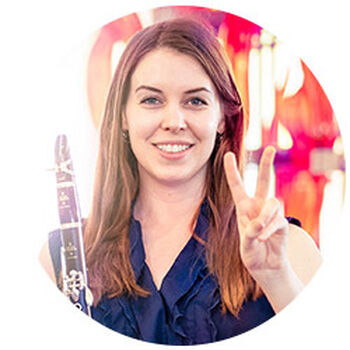Creating a Syllabus for a Private Studio
by Jenny Maclay
Date Posted: August 03, 2017

Chances are, your band director, theory professor, music history teacher, or studio professor are very familiar with syllabi. Most institutions require educators to maintain up-to-date syllabi outlining their expectations, objectives, assignments, and overviews for their classes. For students, these are the papers you probably pretended to read and then threw away after they were distributed on the first day of classes (and frantically searched for during finals week to calculate your grade).
A syllabus is a valuable tool not only for educators, but also a great resource for students. Syllabi allow educators to organize their ideas for a class while simultaneously providing students with clear guidelines and expectations on their part. While syllabi are commonplace in institutions, there is a surprising absence among private instructors.
Every private instructor has dealt with last-minute “emergency” cancellations, students showing up without lesson materials, the “I forgot your check” parent, and the always-popular student who just won’t practice. Whereas these truancies can be reflected in grades at institutions, there is no clear outline of expectations for many private studios. Cue the syllabus – this is a chance for private teachers to provide information and structure to students and parents during private lesson instruction. Syllabi are effective means of communication, regardless of how many students are in your studio. Each private instructor should maintain a syllabus for their studio, where every question an existing or potential student or parent might have.
Each syllabus will be unique to each teacher, but here are some common components in syllabi:
Expectations:
This is where you describe your expectations of your students. How often should they practice? What kind of attitude would you like them to exhibit during lessons? Will they complete a practice chart each week? Will there be any homework assignments between lessons?
Philosophy:
What are your beliefs as a teacher? What fundamentals of the instrument do you focus on with your students? Will fundamental practice be supplemented with music theory or history? Why do you enjoy teaching music?
Contact Information:
Provide your name and an e-mail address and phone number where you wish to be contacted. Specify if texting is an acceptable means of communication for you. If you prefer payment to be mailed to you, provide a mailing address.
Goals:
Obviously, goals will be different depending on the student, but you should describe general goals for your entire studio. (Improve instrumental fundamentals, learn new repertoire, audition for All-State, etc.)
Materials:
Again, materials will vary depending on the student. Include a list of required music, materials, and repertoire. Some common items include pencil, staff paper, notebook paper, tuner, metronome, and any assignments. A properly working instrument and good reed are at the top of my list – you would be surprised by how many students show up with an instrument that won’t play!
*You should also specify that students bring the original published music – photocopies of music are sometimes illegal and also hurt the music publishing business.
Attendance Policy:
Describe your attendance policy in great detail so that there is no confusion when an absence occurs. How far in advance must you be notified of cancellations or rescheduling? Will a student be charged for a no-show? What is your policy on makeup lessons? Can you double up on lessons for a week? What is the protocol for tardiness?
Pricing and Payment:
How much do you charge for a lesson? Do you offer 30, 45, and 60 minute lessons? Do you expect to be paid at each lesson, biweekly, or monthly? Will last-minute cancellations or no-shows be charged?
Resources:
Include links to websites, blurbs about books, and anything else you believe will be useful to your studio. I have included several links to music theory websites, sight-reading exercises, musical vendors and companies, and recordings of top-notch performers. If you have a website, this is the place to include it.
About Me:
A biography or highlights from your career allow students and parents to learn more about you. You might also include fun facts about yourself.
Feel free to pick and choose which components you would like in your syllabus (and also feel free to create your own!). Not only is this a chance for you to organize your thoughts and expectations for your students, but also for yourself. If you have a studio website, it is a great idea to include this online for parents and students to access anytime.
Good luck, and happy syllabus-writing!
*We'd love to hear your syllabi writing tips in the comments box below!

Dr. Jenny Maclay enjoys a diverse career as a clarinet soloist, recitalist, orchestral player, chamber musician, pedagogue, and blogger. In 2021, she was the Visiting Instructor of Clarinet at Brandon University (Canada) and was Visiting Lecturer of Clarinet at Iowa State University in 2020. Online, she is known as Jenny Clarinet, where she created her eponymous popular blog, and she is also the Social Media Coordinator for the International Clarinet Association.
In addition to teaching and performing, Jenny is also interested in travelling and researching clarinet cultures around the world. To date, she has visited and performed in over 30 countries, and she enjoys meeting other clarinetists during her travels. Recently, she was selected by the Council of Faroese Artists as an artist-in-residence in Tjørnuvík, Faroe Islands, where she performed and promoted clarinet compositions by Faroese composers. She has also been named an Artist-in-Residence Niederösterreich, and she will study the clarinet compositions of Ernst Krenek and his wife Gladys Nordenstrom during her residency in Austria in 2022.
Jenny was the recipient of the 2015-2016 Harriet Hale Woolley Award for musical study in Paris, where she was an artist-in-residence at the Fondation des Etats-Unis. She received her Master of Musique, interprétation, et patrimoine at the Versailles Conservatoire in the class of Philippe Cuper and her Doctorat en musique interprétation at the Université de Montréal in the class of André Moisan. She has achieved a number of other notable musical honors, including selection as a prizewinner, finalist, and semi-finalist for such international competitions as Concerts Artists Guild and Astral Artists, and other recent prizes include 1st prize at the 2017 Clé d’Or international music competition and highest-ranking clarinetist at the 2016 Tunbridge Wells International Young Artist Competition in England. Most recently, Jenny performed a virtual recital at the International Clarinet Association’s ClarinetFest 2021, featuring a transcription of Brahms’ Zwei Gesänge, Op. 91 for clarinet, theremin, and piano. Other recent performances include a virtual recital for the U.S. Embassy France and a collaborative duo recital with Sauro Berti, solo bass clarinetist of Teatro dell’Opera di Roma at ClarinetFest 2019.
Jenny has performed with orchestras throughout Europe and North America. In 2017, she toured with the Jeune Philharmonie franco-allemande et hongroise, an international orchestra comprised of musicians from over 20 different countries. During past seasons, she has performed with several orchestras, including the Ensemble Orchestral Les Voyages Extraordinaires, Écoute Ensemble de Musique Contemporaine, Orchestre d’Harmonie de Levallois, Florida Orchestra, Valdosta Symphony, and Ocala Symphony. As a chamber musician, she has performed several masterworks in prestigious venues, including the Mozart clarinet quintet at La Seine Musicale and the Messiaen Quatuor pour la fin du temps at the Fondation des Etats-Unis in Paris.
Jenny received her Bachelor of Music Degree in Clarinet Performance from the University of Florida, where she graduated summa cum laude and was a Fulbright Scholar alternate. Her teachers include Philippe Cuper, Karl Leister, André Moisan, Mitchell Estrin, Todd Waldecker, John Cooper, and Donald Dowdy. She was the youngest presenter of refereed research at the 2014 International Clarinet Association ClarinetFest. Recently, Jenny has been an invited artist and presented lectures on musicpreneurship at Louisiana State University, University of Memphis, University of Iowa, Loyola University, Millikin University, Middle Tennessee State University, University of Alabama Birmingham, University of Central Florida, University of South Florida, University of Southern Mississippi, and has been a featured soloist at the keynote ceremony of the Alabama Music Educators Association Conference.
Jenny Clarinet has been featured in The Clarinet and the Clarineat podcast and has been named one of Feedspot’s “Top 20 Clarinet Blogs, Websites, and Influencers to Follow.” To date, she has published over 300 articles which have been read in over 177 countries and translated into multiple languages, and she has contributed articles which have been featured in The Clarinet, Vandoren WAVE newsletter, Deutsche Klarinetten-Gesellschaft, Rodriguez Musical Services blog, and Lisa’s Clarinet Shop blog. Her first book, an examination of unaccompanied clarinet repertoire, is currently in publication. Jenny Maclay performs exclusively on Vandoren reeds, mouthpieces, and ligatures.
In addition to clarinet, Jenny is also learning to play the theremin, an early electronic instrument and the only one played without physical contact. After writing this blog post, Jenny became interested in the theremin and has collaborated and performed with theremin virtuosi Grégoire Blanc and Charlie Draper. You can listen to some of these collaborations here and here.
When she’s not onstage or in a practice room, Jenny enjoys travelling and has visited over 30 countries. During her travels, she likes to befriend the local cats and enjoys reading books at kitschy cafés. Her caffeination of choice is espresso or Earl Grey tea.